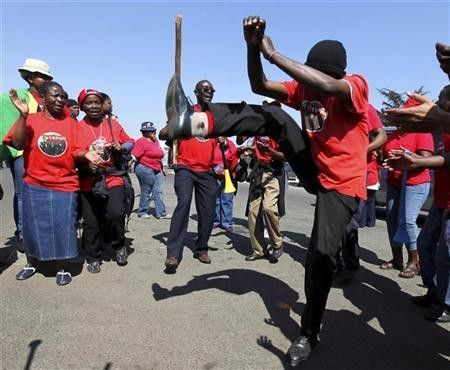S.Africa's municipal workers strike over wages

More than 200,000 South African municipal workers walked off the job on Monday, a trade union said, in a strike which intensifies labour strife that has rocked Africa's biggest economy.
Disruptions are expected to garbage collection and water repairs in urban areas but the indefinite action should not deal as heavy a blow to the overall economy as previous strikes in the mining and fuel sectors, which may curb growth.
Workers at the SAMWU union are asking formally for a wage increase of 18 percent, well above the 5 percent inflation rate, and have said they will not settle for less than a double-digit increase. Employers have offered 6 percent.
"In all likelihood, municipal workers will not get 18 percent," SAMWU spokesman Tahir Sema told Reuters. "We do have a bottom line position of 10 percent. We are not willing to compromise or settle for anything less than 10 percent."
No talks are planned with the employers.
SAMWU said 145,000 of its members joined the strike along with more than 55,000 from other unions. Its previous rallies have been punctuated by members parading through urban centres, overturning rubbish bins and spreading litter on streets.
Most of the disputes in the current, annual mid-year bargaining session, known locally as "strike season", have been settled with deals for 7-10 percent wage increases.
Economists have said settlements well above inflation make the country less competitive by pushing up the cost for a workforce already more expensive and less efficient than its emerging market rivals.
Employers have responded by cutting jobs in a country where unemployment is already running at 25 percent.
The ruling African National Congress, in a governing alliance with organised labour, does not want to antagonise a group that has supplied it with millions of votes by pushing workers to accept more modest pay hikes.
PLATINUM AND ELECTRICITY
In other wage disputes, platinum miners and union members of state utility Eskom have been in talks with employers, who are trying to head off strikes in the two vital sectors.
Talks are expected this week between the powerful National Union of Mineworkers (NUM) and the world's top two platinum producers, Anglo American Platinum and Impala Platinum (Implats).
Since South Africa is the biggest producer of the precious metal used in jewelry and catalytic converters for cars, any strike would probably have an impact on global platinum prices.
The NUM said on Saturday that Implats had improved its pay rise offer to between 8 and 10 percent, but the labour group wants bigger, double-digit, increases.
NUM members at Eskom and two other unions plan a meeting on Tuesday on whether to accept a 7 percent offer from the utility that supplies nearly all of the country's power. The unions, which won hefty wage hikes last year, have been seeking 13 percent this year.
Any significant pay rises would affect the utility's strained balance sheet and could lead to further steep rises in electricity tariffs.
© Copyright Thomson Reuters 2024. All rights reserved.





















